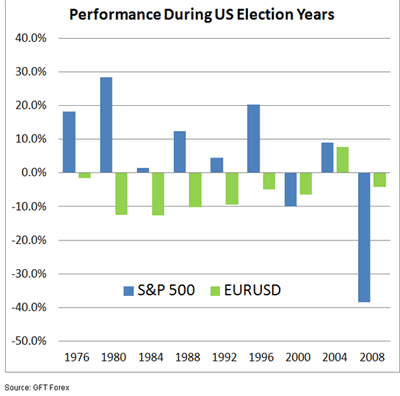When it comes to trading forex, there is an old saying that “Politics Trumps Economics.” The performance of a country’s economy is generally the most important determining factor for the value of a currency but political developments can oftentimes derail the trend of a currency.
The debt restructuring talks in Greece were a perfect example–for months now, the EUR/USD was both a victim and a beneficiary of headline risk–throughout January and into February, the EUR/USD would experience major intraday swings based on nothing more than news, rumors, and speculation that a deal between the Greek government and its creditors were close.
When deadlines would pass with no new developments, investors punished the euro for their disappointment. 2012 is a big year for politics with ten countries holding presidential elections. The potential leadership changes in the United States, France, Russia, Venezuela, Hong Kong, Finland, India, South Korea, Mexico, and Taiwan are all important, but some more so than others. For example, the outcome of the elections in Hong Kong, Finland, and Taiwan will only impact the markets domestically, whereas the outcome of the US and French elections could have global repercussions.
In the US, President Barack Obama is up for reelection, and with the US economy still in the dumps, he may have a tough time securing his seat in November. Although the election in the US will receive more global coverage, the most immediate risk for the currency market will be the election in France. On April 22, France will hold their first round of elections, which will then be followed by a second round on May 6.
As of mid-February, there has been very little focus on the French elections but come March, attention will quickly turn to Sarkozy’s chance for reelection. The Sarkozy years have not been easy ones. Since taking office in 2007, the global financial markets have collapsed, Europe has found itself mired in a sovereign debt crisis and France has been stripped of its prized AAA rating. Not all of this can be blamed on Sarkozy because in many ways, these were the cards that he had been dealt.
The way he managed his deck, on the other hand, is up for a hearty debate. In September 2011, the left gained control of the Senate for the first time in 53 years. With this victory beneath their belt, the Socialists chose Francois Hollande to be Sarkozy’s chief rival and as of mid-February, he leads Sarkozy comfortably in the polls. A loss by Sarkozy could be a major game change for Franco/German relations as well as well as Europe’s response to the sovereign debt crisis.
It is widely believed that throughout the crisis, France acquiesced too easily the Germans which may explain why Merkel threw her official support behind Sarkozy. This worked well for Merkel who was able to dictate demands on trouble nations. Hollande on the other hand could really shake things up and cause problems for Germany because he is running on campaign that would involve renegotiating the fiscal compact and championing for greater involvement by the ECB. He is also in favor of Eurobonds, which is something that the German government opposes vehemently. A win by Hollande would create quite a bit of initial uncertainty that could hurt more than help the EUR/USD.
Across the Atlantic, a high level of unemployment and sluggish growth means that President Barack Obama will not be a shoe in for reelection. So far, Americans are focused on the selection of a Republican to challenge Obama–none of the candidates are particularly inspiring but with more than five months to go before the Republican National Convention on August 27, the Republican Party has plenty of time to build up a strong campaign. Obama’s chances are good, particularly if the unemployment rate sinks below 8% but the mood in America is flat and sour. Regardless of whether a Republican or a Democrat is elected, deficit reduction and the promotion of growth need to be key priorities. Traditionally the markets react more positively to a win by Republicans because of their business friendly policies but President Obama is also doing all he can to support small and large businesses at this vulnerable state in the US economy.
For investors, the Presidential battles in Washington and Paris mean that world leaders will be more focused on domestic developments than global cooperation. Unfortunately, this comes at a dangerous time when countries around the world need to work together to help each other rise from the ashes. For the currency market, an inward focus could mean less global progress and more risk aversion/deleveraging/demand for safe havens like the US dollar. Stocks usually perform well in election years–2008 was different because we had the financial crisis but over the past five decades stocks fell only four out of 17 election years.
Using the Deutsch mark as a proxy, we analyzed data on the EUR/USD going back to the 1970s, which covers nine election years in the US. As shown in the table below, we found that the EUR/USD weakened eight out of the nine election years by an average of 6%. In other words, the US dollar tends to perform well against the euro in election years. No consistent election year patterns were found in USD/JPY or the Dollar Index. Although history does not always repeat itself, it is helpful to understand where the seasonal bias lies.
The EUR/USD has performed extremely well in the start of the year, but eight out of nine times are very high odds and for this reason, we would not be surprised to see the EUR/USD reverse trend as the year progresses.
Political change in some parts of the world will be more seamless with Putin set to replace Medvedev as the President of Russia. Hugo Chavez’s regime is widely popular in Venezuela but his ailing health could affect his October election bid in a year when Venezuelan politics will be highly competitive and polarized.











